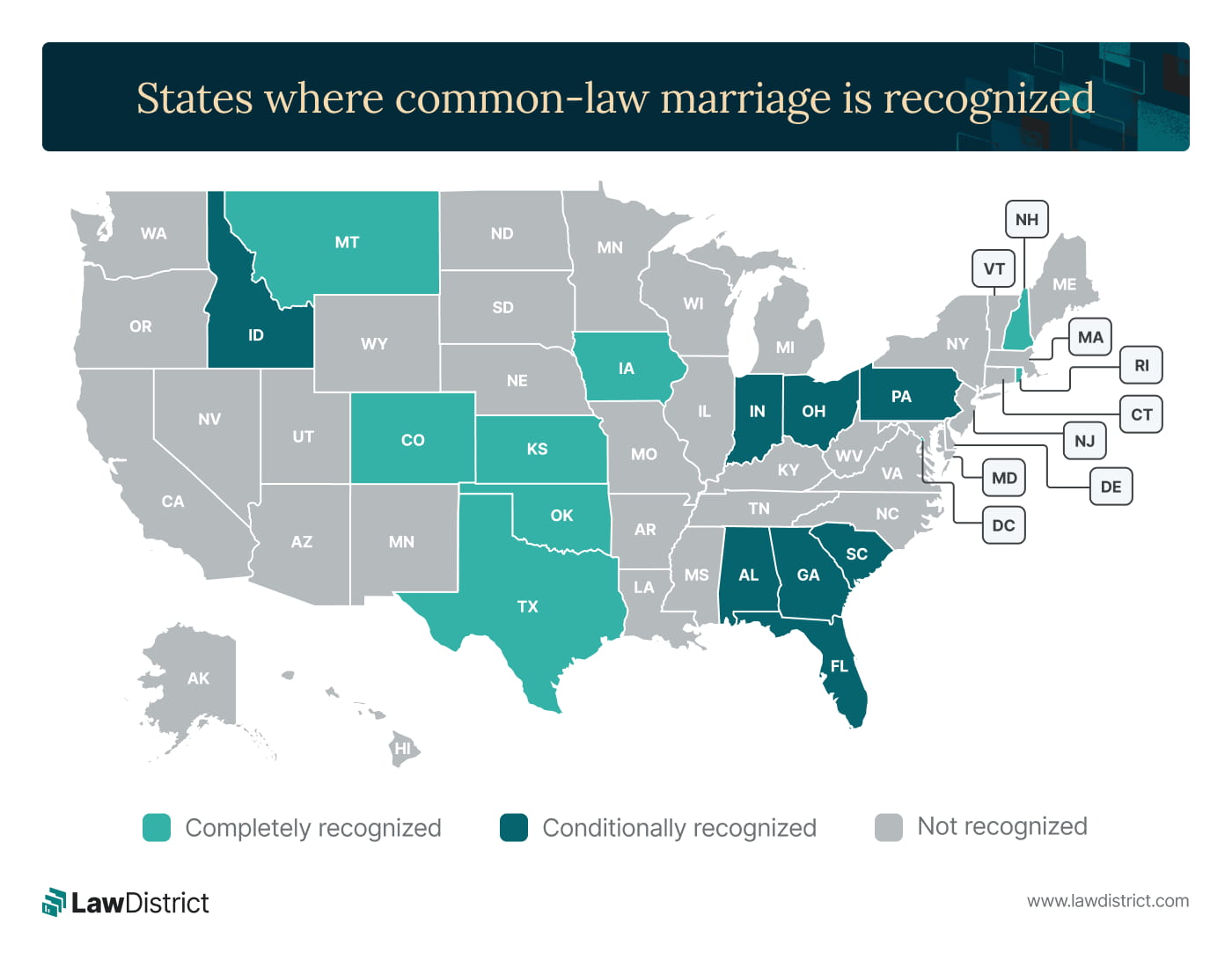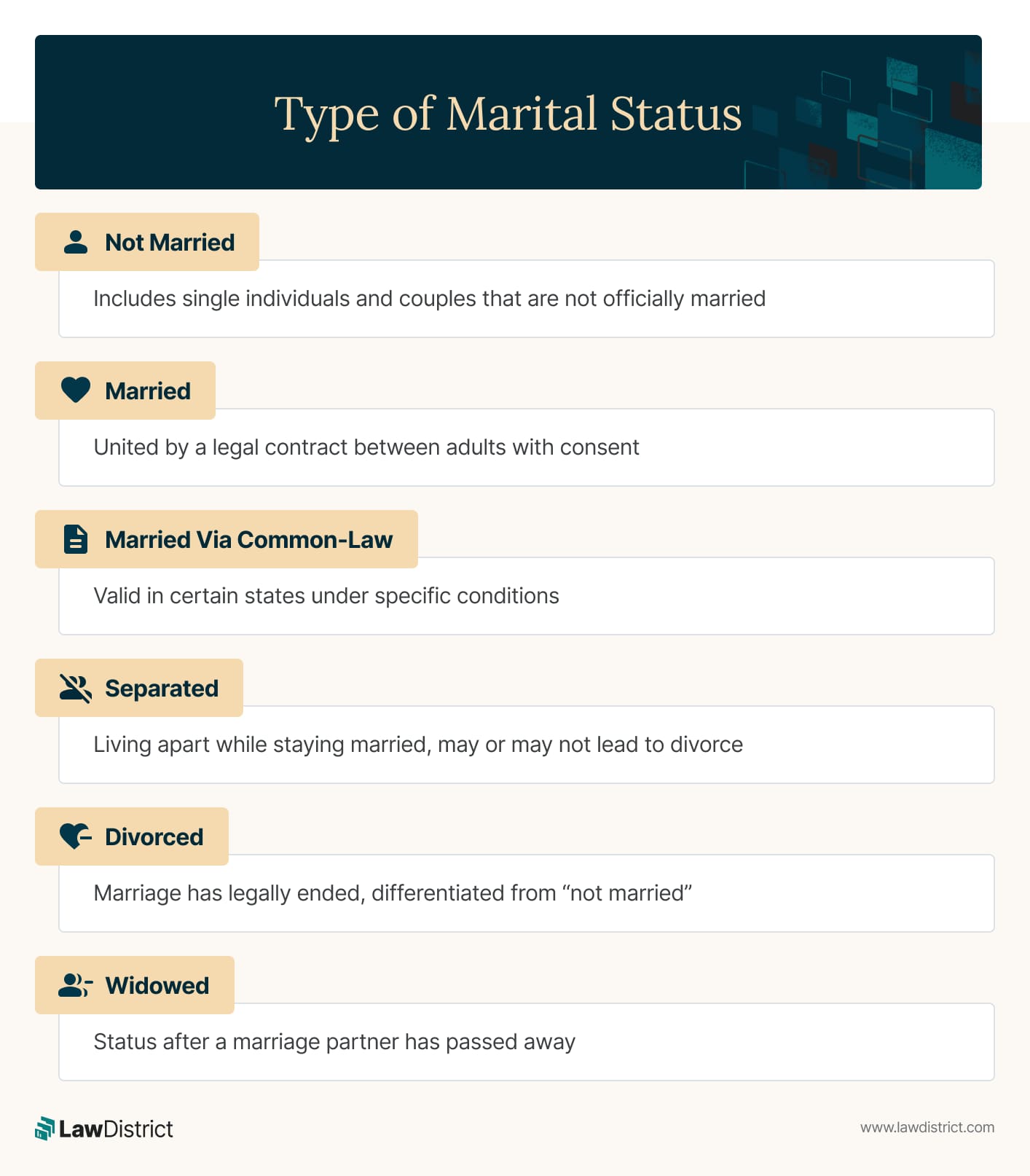Many of us are reminded of our civil status when we file taxes or fill out other official forms. An individual's marital status also affects other aspects of their life, but it should never be a reason for discrimination.
Married people, for example, may receive tax benefits that are not available to singles.
Some who reside in the same home with their partners but have yet to obtain a marriage license or certificate may wonder what to say regarding their civil status. The United States recognizes several types of marital statuses.
!
Some marital statuses are voluntary, while others—for example, being widowed—are beyond a person's control.
This article explores each marital status type. We will also see which states recognize common-law marriages.
Types of Marital Status in the United States
Federal and state laws recognize a variety of civil statuses. Let’s go through each one by one to understand better what each type means.
Not married
Unmarried individuals have no spouse, and they have never been married. When filling out documents and surveys, they may rightly select "never married" or "single."
Dating couples, engaged or not, fall in this category. They may not feel single, but the law sees them as such until they formalize their relationship.
Divorced and widowed individuals may refer to themselves as single. However, their situation is different because they do not have the financial and legal autonomy of someone who has never been married.
Married
Married couples have a legal marriage contract resulting from a wedding, whether a simple affair at a courthouse or a lavish wedding. For individuals to be married, they must:
- Be of legal age
- Have mutual consent
- Sign a certificate
- Not be currently married
Some states require the couple to obtain a marriage license before getting married. A government authority or religious organization issues the permit, allowing the parties to marry.
Most states accept only a single living spouse for each individual. Unless they divorce, their partner dies, or a court annuls the marriage contract, they cannot marry another person.
Bigamy is outlawed and can attract penalties or jail terms in some states. In Texas, for example, a bigamist faces two to ten years in prison and a $10,000 fine (Texas Penal Code Section 25.01).
When a couple marries, they enter into a formal relationship with responsibilities and benefits. They may be entitled to inherit each other's social security, life insurance, or pension benefits. Civil marriage removes any doubt regarding the next of kin when resolving divorce or probate matters.
It is common for people to sign prenuptial agreements to predetermine what happens to their assets if they divorce or a spouse dies. If you are already married, no fear, you can still draw up a postnuptial agreement.
Start a Postnuptial Agreement now
Common-law marriage
Historically, the US adopted English laws that allowed official marriages without a license or certificate. These unions make up common-law marriages. Today, most state laws require that couples formally register their marriage, but you may be asking yourself, what does common-law marriage mean?
When two people have resided together for some time, present themselves as married to relatives and outsiders, and share in investments, they may claim to be married. Some states recognize such a union and award them similar rights to a formally wedded couple. The couple would have to divorce in court to terminate the relationship.
Common-law marriage is lawful in a handful of states. As of 2024, only seven states and the District of Columbia fully recognize such unions:
- Colorado
- District of Columbia
- Iowa
- Kansas
- Montana
- Oklahoma
- Rhode Island
- Texas
Nine other states accept these unions but with restrictions. For example, Alabama only recognizes common-law marriages that started before January 1, 2017. The remaining states will only recognize these marriages from a common-law state, as seen in the map below.

Proof of common-law marriage differs in every jurisdiction. The acceptable factors generally include the following:
- Two people are free to marry and consent to living together as spouses.
- Presenting themselves as married.
- Using a spouse's last name.
- Buying property together.
- Referring to each other as partners or spouses.
- Signing a Cohabitation Agreement.
- Contributing to child or spousal support.
- Listing the other person as a beneficiary in insurance policies.
- Promising or showing intentions of getting married someday.
- Sharing in domestic responsibilities.
Each court considers various factors to establish the validity of a common-law marriage. Despite common belief, residing in the same home for seven years or any period is not enough to make you married.
If one party dies, proving the validity of these informal marriages can be taxing. A judge may rule that you are unmarried because of insufficient evidence.
Separated
Some married couples choose to live apart while staying married. Many take this step as they wait to finalize a divorce. Others separate to determine whether they are better off on their own. Still, others want to keep their married status but wish to live separate lives.
Such couples do well to sign a separation agreement. This contract determines the allocation of property, bills, debts, child support, custody, and other shared responsibilities. The agreement can be temporary or permanent.
Start your Separation Agreement now
Divorced
Unlike separation, divorce legally ends a marriage through a formal and legal process. Divorcees may be responsible for legalities from previous marriages. Some pay spousal support or share marital property with their previous spouse. They can use a Divorce Settlement Agreement to divide assets and liabilities.
Divorced individuals are free to remarry other people or each other if they so choose. However, their official civil status does not revert to single. The only way to reset to "single" status is by annulment, not divorce.
Widowed
The death of a marriage partner instantly changes the surviving spouse's civil status from married to widowed. Like a single person, a widowed individual is free to remarry. However, their financial and property ownership affairs may tie them to their deceased spouse. For example, they may inherit assets and liabilities from the marriage.

Why Does Marital Status Matter?
Stating your marital status is essential in certain situations. For example, you may mention your spouse as next of kin in your employment contract or as a life insurance beneficiary.
However, someone's marital status should not be a reason for discrimination. It is illegal for interviewers to ask potential employees about their civil status. Including such questions in job application forms may break local and discrimination laws. Job seekers can take legal action against an employer who denies them a position based on whether or not they are married.
Helpful Resources:
Texas Penal Code - Chapter 25: Offenses Against The Family




